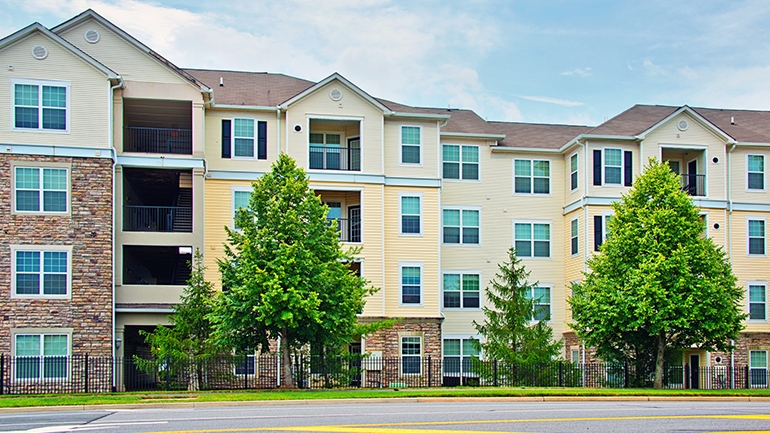The pandemic could end up hurting most those who can least afford it
Even prior to the COVID-19 pandemic, it was a struggle to build or find affordable housing.
But since the pandemic broke out, with so many hourly wage earners out of work, affordable housing may be even harder to find, according to Andrew Warren, TD Senior Vice President in Commercial Real Estate.
"The lack of affordable housing was an urban, suburban and rural problem even before COVID-19," Warren said. "Rent-burdened families and seniors living on a budget reside in almost every small and large city in America."
A problem made worse by a global pandemic
COVID-19 stay-at-home orders have closed most non-essential businesses, only making things more precarious for people previously living paycheck-to-paycheck, now faced with unemployment.
"I don't see companies re-hiring as quickly as the mass layoffs and furloughs happened, so the economic effects of the virus could be felt across the country for a long time given how widespread the unemployment situation is right now," Warren said.
Furthermore, stay-at-home mandates may last longer in more populated cities that are already severely rent burdened, since there's a high risk of a resurgence of the virus when people live in closer proximity or rely on mass transportation.
The bottom line is that those most affected by COVID-19 financially will have the longest road to recovery, and sadly, most are those who need affordable housing.
The cycle of multifamily housing
Though the conversation has been polarized as a give-and-take between landlords and renters, that's not the whole picture.
Renters are trying hard to make rent but some just can't, so that hardship then tilts onto landlords who are trying to cover mortgages, payroll, taxes, and other upkeep costs like cleaning, all of which are important to keeping people safe and salvaging the economy.
The CARES act gave everyone a short-term bail-out, said Warren. But for how long?
The federal government's economic stimulus program can help individuals and businesses stay afloat, but what about housing for those who will need to find a new job when this is all over?
"The challenge is that while there have been relief programs for small to mid-size businesses to pay employees, there has been no talk about stabilizing the housing market," said Warren.
The stimulus, additional unemployment benefits and even the Payroll Protection Program may help in the short-term.
"We need the government to provide resources to landlords and tenants through rental assistance, subsidies and other tools in its arsenal to ensure people unable to return to work can be saved from foreclosure and eviction," Warren added.
Time may be running out for renters
April rent data showed collections were lower than normal, according to Warren. But it's a lot better than some people were predicting, given the unbelievable number of people currently out of work.
"We're all waiting to see if people are able to still make rent in May and June, though," Warren said.
Warren said the harshest effects could be seen once COVID-19 rent and eviction protections are lifted, especially in areas that historically don't have laws in place to protect these renters. At some point, unpaid rent will need to be paid back, but how will out of work households be able to afford that?
"I believe that people will do everything they can to stay in their homes, even as they contend with unemployment," Warren added. "But this can only last so long, since more than half of Americans had less than $1,000 in emergency savings.
We could see a sharp decrease in collection in coming months, which would mean more people at risk of losing their housing for themselves and their families. That loss will be passed through if landlords can't cover their own expenses and mortgages, compounding the negative impact at each level as it flows through the system.
What can be done
The ability to keep up with the growing need for affordable housing depends entirely on subsidy programs that fill gaps private lenders and investors can't.
Given the anticipated municipal tax and revenue losses, there's going to be limited state and local resources to expand affordable housing, but sadly at a time when that's probably needed more than ever, said Warren.
The federal government has a responsibility to figure out a program now, so we can get ahead of rising evictions in the coming months if and when people are still out of work and can't afford to pay rent.
Then, there's the topic of adding more affordable housing to the market.
On a positive note, states and cities everywhere have recognized that addressing the rent crisis is critical, and affordable housing projects have been almost universally permitted to keep construction sites open. Looking back at 2008, the development of affordable housing was identified early as an important way to stimulate the economic recovery, and the federal government provided funds and tax relief to spur immediate investment with the highest impact.
Warren said TD is proud to be one of the banks still closing on new projects that develop affordable housing, even during this crisis. This kind of growth needs to continue and even expand where possible.
"We can't think of a more important time to affirm our commitment to the Community Reinvestment Act and to help our low- and moderate-income friends, families and neighbors in need," said Warren.
